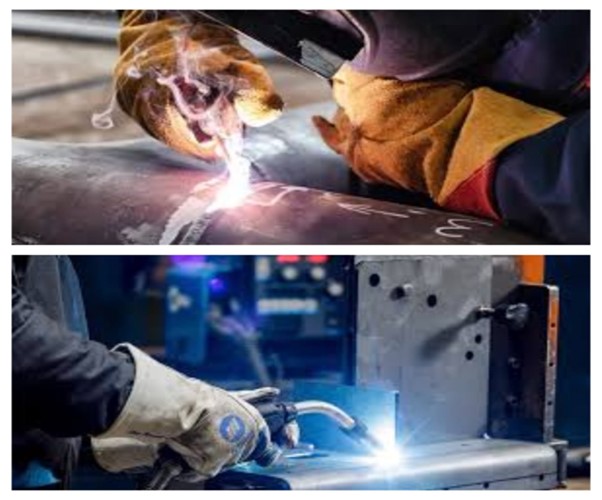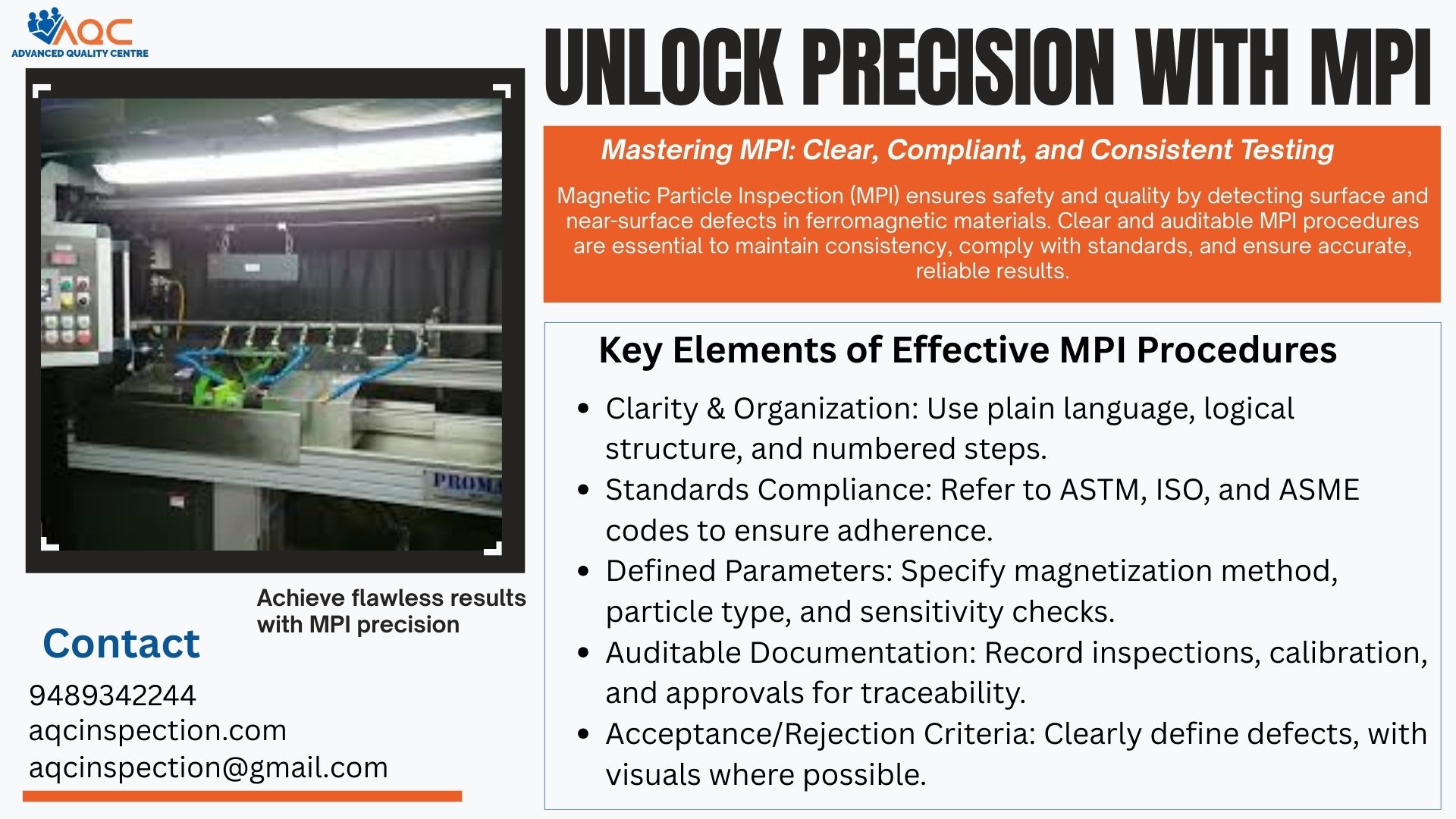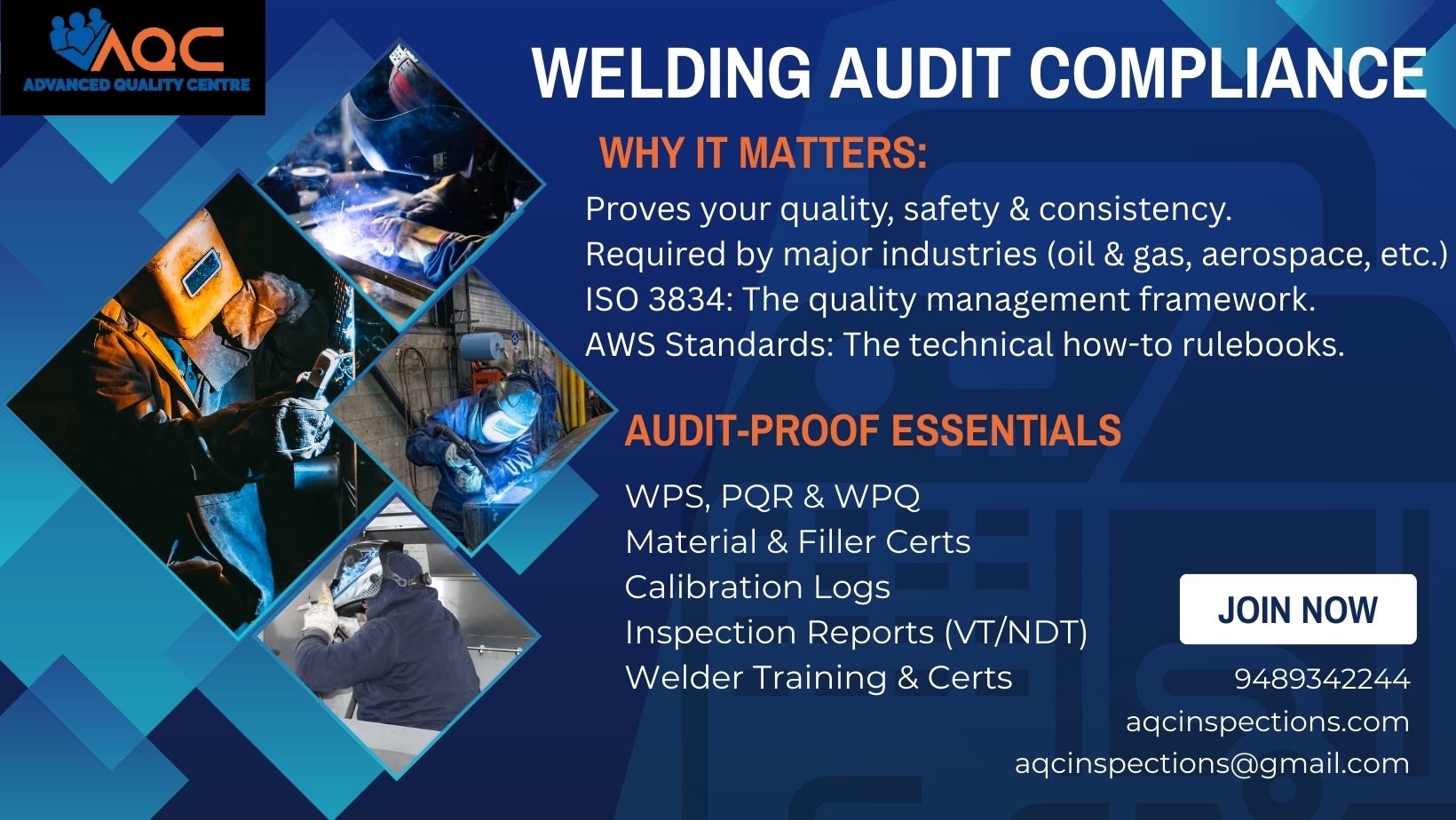Flux-Cored Arc Welding (FCAW) is one of the most versatile and efficient welding processes used in industries such as construction, manufacturing, shipbuilding, and more. At AQC Advanced Quality Centre, we specialize in training welders in the art and science of FCAW, providing hands-on instruction that prepares you to take on complex welding projects with confidence and get skilled with welding certification.
In this blog, we’ll explore Flux-Cored Arc Welding, its applications, benefits, and why AQC Advanced Quality Centre is the ideal place for you to learn and master FCAW and get welding certification.
What is Flux-Cored Arc Welding (FCAW)?
Flux-Cored Arc Welding (FCAW) is a variation of MIG (Metal Inert Gas) welding that uses a continuously fed consumable electrode with a flux core. The flux inside the wire serves as a shielding agent that protects the weld pool from contaminants in the air, similar to the role played by inert gases in traditional MIG welding. FCAW is known for its speed, high deposition rate, and ability to work in outdoor environments or on dirty or rusty surfaces.
How Does FCAW Work?
The process involves feeding a tubular wire electrode through a welding gun. As the electrode is fed into the weld pool, it melts and combines with the base metal, forming a strong bond. The flux core within the wire generates gases and slag that shield the weld from oxidation and contamination, ensuring a clean and durable weld.
There are two main types of FCAW:
- Self-Shielded FCAW: This type doesn’t require external shielding gas, making it ideal for outdoor work where wind might blow away the shielding gas. It is often used for heavy fabrication in industries like construction, shipbuilding, and pipeline welding.
- Gas-Shielded FCAW: In this variant, an external shielding gas (such as CO2 or a mixture of argon and CO2) is used to protect the weld pool, allowing for better control over the weld bead and improved quality.
Advantages of Flux-Cored Arc Welding (FCAW)
- High Productivity: FCAW has a higher deposition rate compared to many other welding processes, making it ideal for high-volume production environments.
- Versatility: It can be used for both thin and thick materials, making it suitable for a wide range of applications, from light gauge materials to heavy-duty structural work.
- Minimal Cleanup: The slag created during FCAW welding is easy to remove, and the welds are cleaner compared to other processes, reducing the need for extensive post-weld cleaning.
- Outdoor Capability: Self-shielded FCAW can be used in windy conditions, making it a popular choice for outdoor construction and pipeline work.
- Strong, High-Quality Welds: FCAW produces strong, durable welds with good penetration and minimal spatter, making it perfect for demanding applications in industries like shipbuilding, heavy equipment manufacturing, and structural fabrication.
- Cost-Effective: Since FCAW does not require an external gas supply, it can be more cost-effective than other welding methods, especially in large-scale projects.
Applications of FCAW Welding certification
Flux-Cored Arc Welding is widely used across various industries due to its versatility and speed. Some of the primary industries and applications that benefit from FCAW include:
- Construction & Structural Fabrication: FCAW is frequently used in the construction of buildings, bridges, and heavy machinery due to its speed and ability to handle thick materials.
- Shipbuilding: The ability to weld thick metals and provide strong, durable joints makes FCAW ideal for shipbuilding projects.
- Pipeline Welding: Self-shielded FCAW is commonly used in pipeline welding, where environmental conditions such as wind can complicate other welding processes.
- Automotive Manufacturing: FCAW is often used in automotive repair and manufacturing, providing fast and reliable welding for body parts and other components.
- Heavy Equipment Manufacturing: The robustness of FCAW welds makes it ideal for manufacturing construction equipment and industrial machinery.
- Maintenance & Repair: FCAW is used for maintenance of machinery, pipelines, and other infrastructure due to its ability to work on rusted and dirty materials.
Welding Certification in FCAW at AQC Advanced Quality Centre
At AQC Advanced Quality Centre, we provide specialized training programs in Flux-Cored Arc Welding that will equip you with the skills and knowledge necessary to excel in the welding industry. Our training includes both theory and hands-on experience, covering key aspects of FCAW such as:
- Basic Principles and Techniques: Understanding the fundamentals of FCAW, including wire types, shielding techniques, and equipment setup.
- Welding Positions: Learning to perform FCAW welds in various positions (flat, horizontal, vertical, and overhead).
- Safety Standards: Emphasis on welding safety, including proper PPE, ventilation, and safe handling of materials.
- Quality Control: Learning how to inspect welds for defects such as porosity, undercutting, and cracking, ensuring high-quality, durable welds.
FCAW welding certification in Chennai, Coimabtore, Hosur and Bangalore
Whether you’re in Coimbatore or Bangalore, AQC Advanced Quality Centre provides top-notch FCAW training tailored to your needs. Our training programs are designed to accommodate both beginners and experienced welders, providing them with the skills to become proficient in FCAW techniques.
Visit our technical and career updates at our Blog site https://advancedqualitycentre.blogspot.com . or
https://ndtcenter.blogspot.com
Subscribe our youtube channel to know more practical explanations https://aqcinspection.com/




